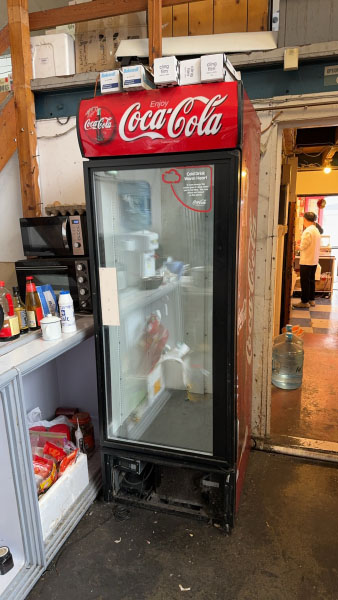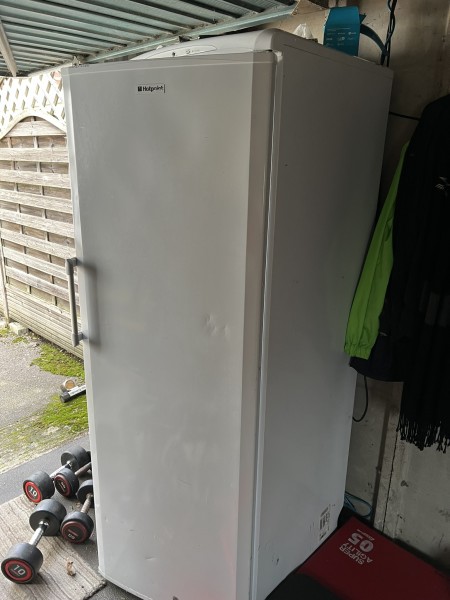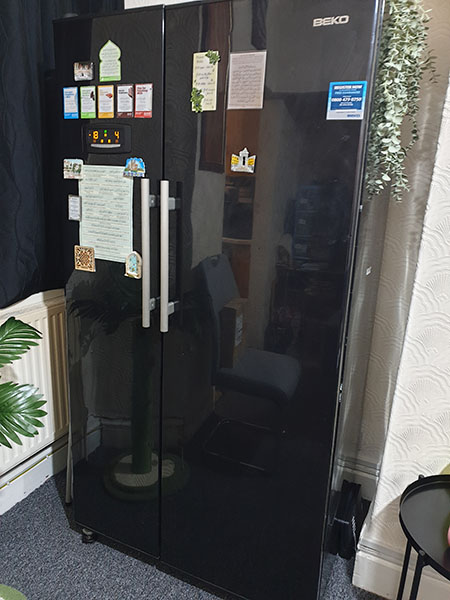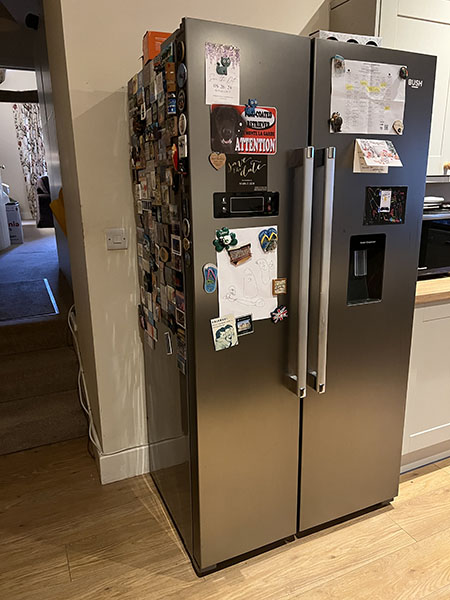Fridge Freezer Removal & Disposal: Comprehensive Guide
 Edited by Ali Lijee
Edited by Ali Lijee
Make Rubbish.com your number one choice for fridge freezer removal in the UK. If your old fridge or freezer is no longer keeping your food cool and it’s time for an upgrade, you’ll be able to find cool prices to have it removed with the man and van rubbish clearance teams listed on this site.
Our independent licensed waste carriers operate in towns and cities across the UK providing eco-friendly rubbish clearance services at competitive prices.
We remove & dispose of fridge freezers
Table of contents:
- Best fridge freezer removal & disposal service UK
- Fridge freezer removal service near you
- Gallery of fridge freezers we have removed
- Fridge freezer removal & disposal: questions people commonly ask
Best fridge freezer removal & disposal service UK
White goods and bulky waste such as refrigerators and freezers are best handled by a qualified rubbish removal team. Whether you’re upgrading to a newer model or you’re moving out and no longer need that ol’ ice box taking up space, getting rid of a fridge can be a laborious task. Leave the heavy lifting to a Rubbish.com member partner instead.
Our licensed waste carriers in the UK can come to your property and disconnect, collect, load, and dispose of a wide range of refrigerators and freezers, such as fridge freezers, compact refrigerators, hotel minibar refrigerators, fizzy & energy drink refrigerators, French door refrigerators, standalone chest freezers, American-style refrigerators, and much more.
Fridge freezer removal service near you
When you choose a man & van rubbish removal company from Rubbish.com, you’ll get to chill out and relax while our trustworthy and hardworking teams collect your unwanted fridge and/or freezer and dispose of it in an eco-friendly manner.
Get great service including same-day rubbish removal at great prices by disposing of your fridge, freezer, or any other white goods or bulky waste with Rubbish.com.
Gallery of fridge freezers we have removed
Fridge freezer removal & disposal: questions people commonly ask
How do I get rid of a refrigerator for free in the UK?
The only consistent ways to get rid of a refrigerator for free in the UK are to sell or donate the fridge or to haul it to your local council tip to dispose of it yourself. Although there is typically no cost to dispose of a refrigerator at the council tip, every tip has its own requirements for how to dispose of waste and rubbish and the potential cost and inconvenience generally isn’t worth it. Instead, allow a man and van rubbish clearance team to collect your unwanted refrigerator.
Can I take a fridge to my local tip?
Household Waste Recycling Centres (aka council tips) in the UK will generally accept unwanted fridges as bulky waste, often for free. Keep in mind that you will need to have a vehicle capable of safely loading and unloading the refrigerator and that vehicle must be permitted at your local tip. You will also need to load and dump your waste and rubbish yourself.
Is it illegal to leave a fridge outside in the UK?
You should not leave a fridge outside on the street in the UK. Although somewhat common, a fridge or other bulky waste left on the street can be considered illegal fly-tipping and you may be fined by your local council for doing so. Fridges and freezers often contain hazardous materials and must be disposed of properly.
Do scrap collectors take fridges?
A scrap man may take a fridge or freezer away, but typically not for free since these white goods cannot be scrapped ordinarily at scrap yards.
Fridges and freezers can be salvaged for their steel, aluminium, copper, and other materials which typically make up around half of the total weight of the fridge/freezer. Many fridges and freezers contain hazardous materials as well as foam insulation and gasses that make them challenging to dispose of, however.
What can you do with an old refrigerator?
Old refrigerators can be sold, given away for free, donated to charity, or disposed of depending on the condition of the refrigerator. If the refrigerator can be refurbished and is in reasonable condition, consider donating it to charity or selling/giving it away.
If the refrigerator is in poor condition then you should either consider arranging for bulky waste collection with your local council, taking it to the council tip yourself, or simply hiring a man and van rubbish removal company to haul it away for you.
How much money can you get from an old refrigerator?
Since refrigerators contain many salvageable scrap metal components such as steel, copper, and aluminium, they may be worth approximately £5-£20 depending on the weight of the scrap metals.
Consider also that the refrigerator will need to be dismantled to salvage the scrap metal components and this can be hazardous and laborious.
Can I put a fridge in a skip?
Most skip hire companies in the UK will not accept fridges in their skips. Despite this, many fridges still end up being illegally fly-tipped into skips. Fridges are white goods but they can be considered hazardous waste as well and must be disposed of properly. Instead, consider hiring a man and van rubbish removal company to haul away your unwanted fridge.
How much does it cost to scrap a fridge freezer?
Our licensed waste carriers have found that the average price of removing a fridge varies from £30-£60 for small fridges and freezers to £50-£80 for large fridges and freezers. This includes disconnecting the appliance and collecting it from the property, loading it into a rubbish removal vehicle, and hauling it to the council tip for disposal.
What to do with a fridge that doesn't work?
If your old fridge no longer works, you should consider disposing of it either by taking it to the council tip yourself, scheduling bulky waste collection from your local council, or letting a man and van rubbish removal team collect it from your home.
Old fridges that no longer work have very little scrap value and take up valuable space in your kitchen. You could turn it into a dry food storage area like a cupboard, but chances are you’ll want to have it disposed of properly instead.
Is a 10-year-old fridge still good?
A 10-year-old fridge is typically near the end of its lifespan and it may or may not still work well for your needs. Most refrigerators last approximately 12 years, on average.
High-quality refrigerators from reputable manufacturers that are well maintained and serviced can last for 15 years or longer; failure to service your refrigerator or to address faults or defects can drastically reduce the lifespan to a few months to a few years.
Can you leave an old fridge outside?
You should refrain from leaving an old fridge outdoors on the pavement. Instead, arrange for bulky waste collection from your local council or take it to the council tip yourself.
To remove an old fridge from your property, it is often much easier and more convenient to leave the task to a licensed waste carrier man and van team.
Is a 20-year-old fridge safe?
A 20-year-old fridge may be perfectly safe so long as you continue to maintain it and address any minor repairs as needed. Although most fridges have a lifespan of around 12 years, high-quality fridges can last for 15+ years provided they are well-maintained.
Note that if your refrigerator was manufactured before 2000, it may be far more challenging to dispose of and you should consider hiring a licensed waste carrier near you to collect it.
Is it worth keeping an old fridge?
Old fridges may be worth holding onto if they are well-maintained and need no major repairs. Keeping an old fridge saves you the cost of fridge removal and disposal and reduces the environmental impact of buying a new refrigerator, but it typically also is costlier in energy bills when compared to newer eco-friendly models.
If your fridge requires major repairs or is costing you far too much in energy bills, it may be worthwhile purchasing a newer eco-friendly fridge and disposing of your old fridge.
How do I dispose of a freezer near me?
To dispose of a freezer near you, consider contacting your local council for bulky waste collection, hauling it to your nearest recycling centre yourself, selling or donating it to a charity, or using a man and van rubbish removal team to collect it.
How are fridges recycled?
Refrigerators are recycled by salvaging any recyclable parts and components as well as scrap metals and sending these to appropriate waste recycling facilities, thereby maximising landfill diversion.
Fridges typically contain a significant amount of steel, aluminium, and copper wiring which can be recycled. Plastic components and foam insulation may also be recyclable.
Why are fridges difficult to dispose of?
Fridges tend to be difficult to dispose of because they often contain hazardous chemicals that are challenging to handle and dispose of properly.
Although fridges are commonly considered white goods and bulky waste, they can also be classified as electronic waste (e-waste) and hazardous waste due to the presence of printed circuit boards and other components that may contain persistent organic pollutants (POPs).
Is a fridge hazardous waste?
Fridges can be considered hazardous waste in the UK due to the presence of refrigerants, hazardous flame retardants, antimony trioxide, printed circuit boards, cables and other components that may contain persistent organic pollutants (POPs).
Old fridges manufactured before 2000 pose unique disposal challenges due to the prevalence of hazardous substances such as chlorofluorocarbons (CFCs) common in refrigerators manufactured before then and before the UK ratified the Montreal Protocol.
How do you dispose of a mini fridge?
The best ways to dispose of a mini fridge include selling or giving it away, donating it to charity, or disposing of it at your local council tip or hiring a man and van rubbish clearance company to dispose of it for you.
Is it safe to dismantle a fridge?
You should not attempt to dismantle a fridge unless you are a qualified domestic appliance technician due to the presence of hazardous substances commonly found in fridges. Refrigerants and other hazardous chemicals common in modern fridges and especially older fridges manufactured before 2000 can lead to caustic burns and skin irritation.
What appliances are worth the most to scrap?
Refrigerators tend to hold the highest scrap value amongst white goods when comparing the total weight of scrap metals and salvageable components to the overall weight of the appliance.
Generally, most refrigerators have substantial quantities of steel, aluminium, and copper weighting 40-60% of the total weight of the fridge.

 GET QUOTES
GET QUOTES


